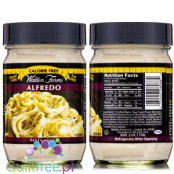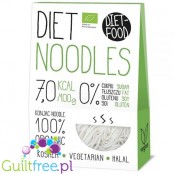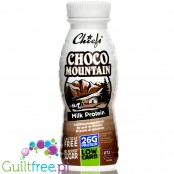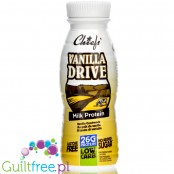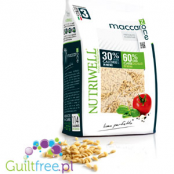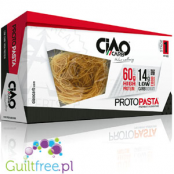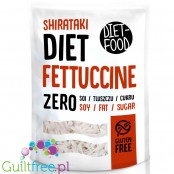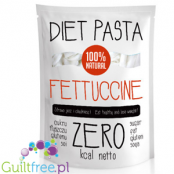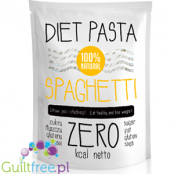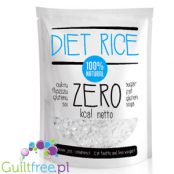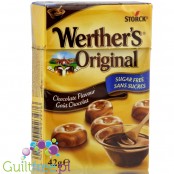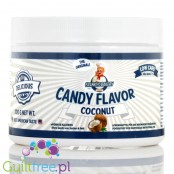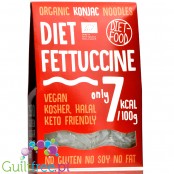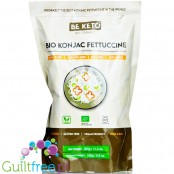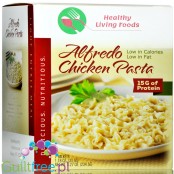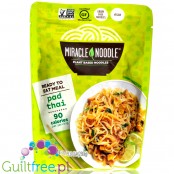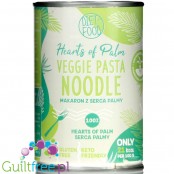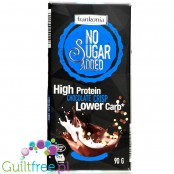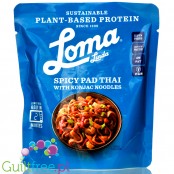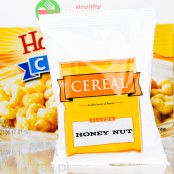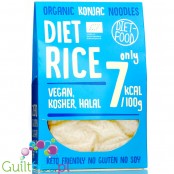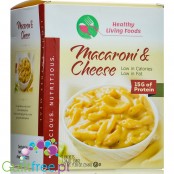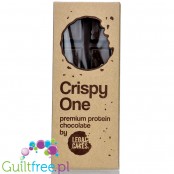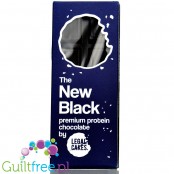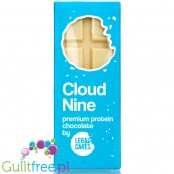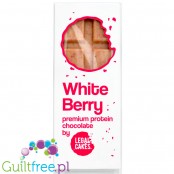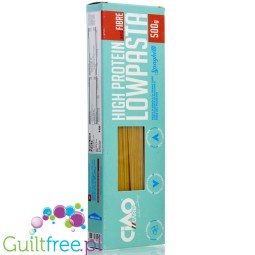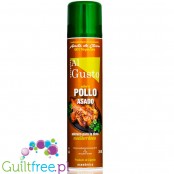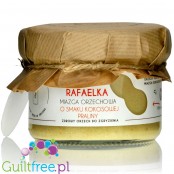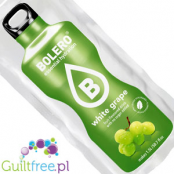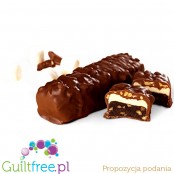Hotline: 885 925 336
E-mail: sklep@guiltfree.pl
Fast shipping up to 48 hours
As many as 12 949 light products
Diet-Food Diet Pasta Udon 200g
Udon-shaped shirataki noodles, characteristic of oriental cuisine.
Udon noodles are one of the most popular types of noodles in Japan. Udon is a thick and powdery noodle made from wheat flour, water and salt, and its texture is thick and soft. Udon noodles are widely used in Japanese cuisine, in dishes such as udon soup, udon salad, stir-fry with udon, and as an accompaniment to meat or vegetarian dishes. In Japan, udon is often eaten with meat or vegetable broth and various toppings such as nori seaweed, eggs, vegetables, pieces of meat or tofu. The winter version with cold soup is called "zaru udon" and is perfect to eat in warm weather.
How many calories in udon noodles?
The caloric content of udon noodles is usually given on the packaging for cooked noodles, which may suggest (incorrectly!) that udon noodles have fewer calories than traditional Italian pasta - meanwhile udon noodles contain a similar amount of calories as regular spaghetti or penne noodles, and often udon noodles have even more calories than Italian pasta - here it is worth noting that the composition and nutritional value of udon pasta may differ from ordinary Italian pasta because udon pasta is usually made only of wheat flour, water and salt, while Italian pasta may contain eggs affecting the higher protein content and different types of flour to lower the glycemic index of the pasta and increase the fiber content. So if you love Japanese cuisine and the meaty texture of udon noodles, it is worth replacing some (or all) of it with udon shirataki konjac noodles during reduction.
The most important information about pasta shirataki konjak:
- 100% natural plant product
- gluten-free
- rich in soluble fiber
- no sugar, starch, protein, gluten
- almost without calories
- Diet-Food JAS is certified by JAS (Japanesse Agricultural Standard)
- odorless, flavorless pasta easily absorbs the taste and aroma of dishes to which it is added
- Easy and fast to prepare, does not require thermal treatment but only preheating
- Suitable for vegans, diabetics, people with food allergies (gluten, soy)
Konjac Pasta Diet Food is a rich source of soluble fiber. Replacing only one meal a day with a shirataki meal results in a significant increase in the daily intake of fiber (up to 12g per serving of 250g) and has a huge impact on lowering the daily intake of calories - both greatly affect weight loss.
Pasta is in a package filled with translucent liquid that is a solution of calcium hydroxide - it is not a preservative, but a stabilizer, thanks to which the pasta retains its shape. When you open the package you can feel the characteristic odor of the starch, the smell disappears completely after the pasta has been poured with running water before preparation.
How to use shirataki pasta:
- let go of the pasta pasta
- pour cold pasta with water, pour cold water
- add to sauce, meat or other dishes (use everywhere you normally use 'normal' pasta) at the very end of cooking, so that the pasta has the temperature you want - you do not need to cook it
Nutrition Facts
Your review appreciation cannot be sent
Report comment
Report sent
Your report cannot be sent
Write your review
Review sent
Your review cannot be sent
Diet Food Udon Zero No Smell - konjac noodles
Net Weight: 270g; net weight after straining the brine 200g
Ingredients: water, konjac root flour, acidity regulator: calcium hydroxide.
Gluten-free product.
Nutritional values in 100g after draining the brine: energy value 7.0kcal / 30.0kJ, fats 0.1g (including saturated fats 0.1g), carbohydrates 0.2g (including sugars 0.1g), fiber 2.6g, protein 0.1g, salt 0.1g
Manufacturer: made in China for PPHU MIPAMA E.Z. Szafarz sp.j.
Storage: After opening, keep in the fridge in brine, tightly closed, consume within 3 days.
Featured Products
Walden Farms Zero Calorie Alfredo Sauce
Bettern than Noodles organic konnyaku & organic oat fiber
Diet-Food Bio Organic Diet Noodles
Chiefs Milk Protein Shake Choco Mountain
Chiefs Milk Protein Shake Vanilla Drive
Ciao Carb Low carb pasta
Ciao Carb Low-carbohydrate pasta in the shape of rice grains
Pasta of high-protein pasta
Diet-Food Diet Pasta Pasta Fettuccine
Diet-Food Diet Pasta Konjac Pasta Spaghetti
Diet-Food Diet Pasta Konjac Rice Pasta
Diet-Food Diet Pasta Fettuccine 1KG
Diet-Food Diet Pasta Konjac Pasta Spaghetti 1 KG
Diet-Food Diet Pasta Konjac Noodles Pasta
Diet-Food Diet Pasta Konjac Rice Pasta
Werther's Original Chocolate candy sugar free, contains no sugars, contain sweetener
Best Joy Olive Oil Cooking Spray for frying
Franky's Bakery Candy Flavor Powdered Food Flavoring, Coconut
Askeys Classic Cones - sugar free ice cream cones
Askeys sugar free Ice Cream wafers with Sweetener
Askeys Cup Cones
Diet-Food Organic shirataki konjak pasta, Fettuccine 300g
Best Joy Cooking Spray Cooking Spray 100% Garlic (250ml)
Best Joy Cooking Spray Cooking Spray Chilli Pepper (250ml)
Best Joy Cooking Spray Cooking Spray Butter Oil (250ml)
BeKeto Organic shirataki konjak pasta, Fettuccine
Best Joy Italian Herbs Cooking Spray for frying
Funky Flavors Sweet Cream 30ml liquid flavoring
Healthy Living Foods Alfredo Chicken Pasta by Healthwise
Miracle Noodle Kitchen, Pad Thai ready to eat diet dish 90kcal
Magnolia Capri - sugar free ice cream cones, only 12kcal
Best Joy Cooking Spray Garlic 100ml
DIET FOOD palm heart pasta 21kcal, Spaghetti, 220g can
DIET FOOD palm heart pasta 21kcal, Noodle, 220g can
DIET FOOD palm heart pasta 21kcal, Spaghetti, 255g box
DIET FOOD palm heart pasta 21kcal, Noodle, 255g box
Frankonia Chocolat No Sugar Added High Protein Chocolate Crisp, 90 G
Loma Linda Pad Thai ready to eat diet plant-based spicy meal with konjac noodles 139kcal
Healthwise Healthy Living Foods Cereal, Honey Nut, gluten free protein cereal, 30g
Healthwise Healthy Living Foods Cereal, Cinnamon with a hint of Vanilla, gluten free protein cereal, 30g
Walden Farms Pasta Sauce, Garlic & Herb 12 oz., US version no sucralose
DIET FOOD palm heart pasta 21kcal, Brown Rice, 255g box
Diet-Food Organic shirataki konjak pasta, Rice 300g
Healthy Living Foods Creamy Chicken Pasta by Healthwise
Healthy Living Foods Macaroni & Cheese by Healthwise
Legal Cakes Crispy One Premium Protein Chocolate 75g
Legal Cakes The New Black Premium Protein Chocolate 75g
Legal Cakes Cloud Nine Premium Protein White Chocolate & Coconut
Legal Cakes White Berry Premium Protein Chocolate 75g
Ciao Carb High Protein & Fiber LowPasta Fusilli 250g
Ciao Carb High Protein & Fiber LowPasta Mezze Maniche 250g
Ciao Carb High Protein & Fiber LowPasta Spaghetti 500g
Other customers also chose
Aerosoles Al Gusto Grilled Chicken - smakowa oliwa extra virgin w spray'u, smak Grillowany Kurczak
Funky Flavors Sweet Grapefruit Pomelo - fat, sugar & calorie free concentrated food flavor
Walden Farms French Dressing USA version, no sucralose, with stevia
Maria and Ricardo's Almond Flour Keto Tortillas, 'Everything' Seasoning 6 tortillas
GBS Angel's Touch instant flavored coffee with caffeine boost White Chocolate
Hartley's 10kcal Blueberry & Blackcurrant Fruit Flavor Jelly
Intenson Slim Fit sugar free jelly, pineapple
Orzechownia Rafaelka 200g natural coconut & cashew spread
Bolero Drink Stevia White Grape, instant, sachet 9g
Bolero Drink Stevia Elderberry, instant, sachet 9g
Konjac Shop Basil Konjac Spaghetti - Konjac shirataki 18 kcal
Funky Flavors Hazelnut for shakes, desserts, yoghurt, ice cream & pancakes
BariatricPal Healthy Living Foods Protein Bar Rockie Road
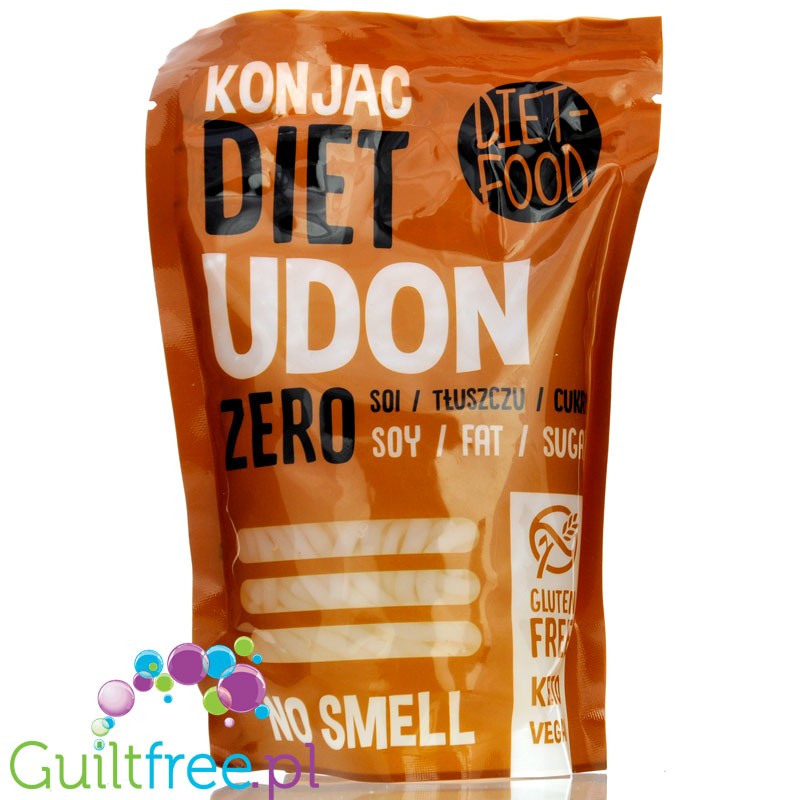
Gluten-free Shirataki Noodles Glucomannan Glutinous Rice is a completely natural, gluten-free konjac pasta that is the least calorie pasta, contains only 6kcal in 100g and thanks to high fiber content gives a very high satiety.






